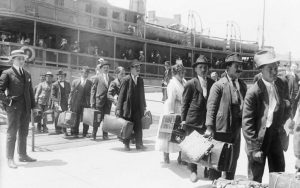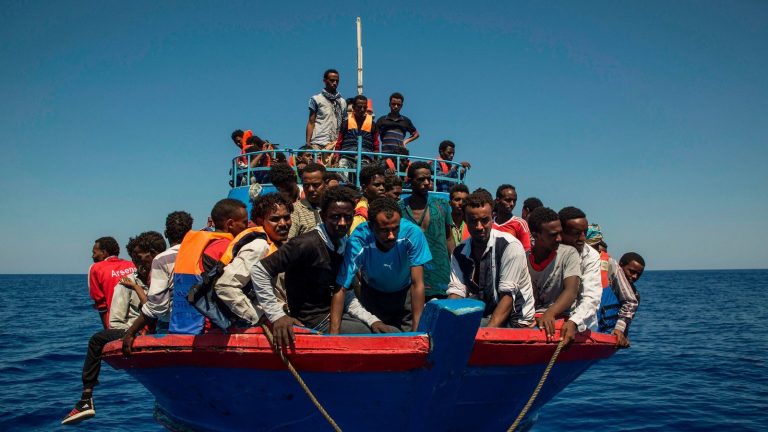You may wonder how immigration can possibly have anything to do with socialism. After all, it isn’t as though the Soviet Union, Maoist China, or modern Venezuela are opening their borders to a flood of people trying to get in. But European “democratic socialism” is an entirely different animal in this respect.
Thirty-five years ago when I first lived in Italy, the country was, for lack of a better term, very homogeneous. Aside from tourists, very few people lived there that could not trace their roots way back to Italy. Those who had immigrated there, usually did so by way of marriage, and it was quite rare. I knew of one Brazilian woman who had married an Italian that lived in Brazil after WWII, and came home. I knew of one English woman who had also married an Italian. Outside of that, there were some Moroccan immigrants that were known for selling trinkets on the beaches and in some of the cities. That was about it.
Pretty much everyone, your friends, the people working the fields, the janitor at the school, the housekeeper… native Italians.
When I would have conversations with them, the topic of living in America would often come up. These discussions often included immigration, and how those coming into the United States from Central America were considered something of an underclass—how many only worked menial jobs, were underpaid, and were not part of society. Many Italians deemed us as racists.
Sound familiar? Keep reading. At the time, this was mostly in a reaction to the filtered news they received regarding the amnesty program being debated during the Reagan administration.
As with today, it was a very complicated topic to engage in. As a Southern Californian, I firmly understood the important role immigration from Central America played in our economy. Many undocumented families (they were called illegal aliens back then, and nobody was offended by the term) were close friends of mine. But I also had a grasp of the fact that there was a matter of balance that needed to be considered.
Everyone benefited from this immigration to a certain degree, but the system could not handle too much of it.
This was an incredibly difficult conversation to have with people who didn’t have to contend with mass immigration in their own country and were left to simply judge from afar based on ideals of a utopian society with no real understanding of the complexities of this topic in a nation 8,000 miles away from them.
Then the Berlin Wall fell and the Soviet Union collapsed. Most Americans seem to think that this happened, and all of the former Soviet Bloc countries simply started dancing in the streets with newfound freedom. That was not at all the case. After decades of Soviet rule, these countries fell into economic and political chaos for a period of time, and all of a sudden the people had the option to leave, to seek a better life.
Many of the European nations were very much like Italy. They had never dealt with mass immigration. Furthermore, they were certainly not going to be as cruel as those Americans. They would welcome these new immigrants with open arms.
Italy saw a massive wave of immigrants arriving mostly from Albania, Romania, and Belarus. In order to help these poor new arrivals, the government established wonderful programs that would provide welfare, housing, and even job opportunities for them. After all, they were the caring democratic socialists, and they needed to help everyone in need. And so the central planners planned everything, centrally.
A Different Kind of Immigration
This was unlike the original calls for immigrants to the United States. The USA told the world to give us their tired, their poor, and their huddled masses. But we also sent a message that there were no guarantees. They needed to be willing to work hard. There was no promise of a welfare check, free education, free healthcare, free housing, and work when people arrived in the United States. They had to come here willing to make it on their own while bearing the full risk of also failing on their own. It was an opportunity with no guarantees of success, and that was a much better promise to millions of immigrants than the prospect of living under the heavy foot of oppressive governments with little or no chance of upward mobility. It was freedom to succeed, and freedom to fail. Those immigrants came with the promise that to a greater extent, they would be allowed to be the masters of their own destiny, and that was a far better proposition than they had at home.
 But these new immigrants we saw arriving in Italy after the Berlin Wall fell didn’t arrive with such an understanding. They were promised a living, education, housing, and so much more, thanks to the taxpayers in an economy that was already collapsing under its own weight, in a country that already had horrifically high unemployment.
But these new immigrants we saw arriving in Italy after the Berlin Wall fell didn’t arrive with such an understanding. They were promised a living, education, housing, and so much more, thanks to the taxpayers in an economy that was already collapsing under its own weight, in a country that already had horrifically high unemployment.
In what seemed like a flash, entire neighborhoods were filled with people from Albania, Romania, Belarus, Poland, and other Soviet Bloc countries. Italians started moaning about the lack of work, but not that there was simply a lack of work, but that they could not get it because “the Albanese” were willing to work for next to nothing under the table, and taking their jobs. After all, for people that came from nothing, next to nothing was a desirable upgrade, especially when supplemented with government assistance. Many Italians could no longer compete in the workplace and naturally didn’t qualify for the refugee aid afforded the new arrivals.
In small villages that had never experienced any real crime, people suddenly found themselves installing high-security locks on all of their doors and erecting fences, because “the Romanians” were rolling through towns doing home invasion robberies.
Employment became more and more scarce, crime skyrocketed, and the people started to blame it all on the new immigrants. The invaders.
It was common now that people would sneer whenever one would speak of them. Immigrants were blamed for taking their jobs, getting welfare from their taxes, getting free housing on their backs, destroying their culture, and bringing a new kind of crime with them.
When we look at this objectively, we cannot blame the immigrants that are seeking a better life. But how do we blame the Italian people for their feelings of resentment? After all, no matter how noble your intentions are, if helping others takes food off your children’s table, resentment cannot help but build. They were paying increasingly high taxes to support this policy, suffering increasing barriers to their ability to work, and getting no assistance. From their perspective, many Italians concluded that the government was taking care of these new immigrants at the expense of the well-being of its own people.
Immigration Turned Upside Down
As much as people in society began to change their ideas on immigration as their standard of living declined, the government simply doubled down. Policies were enacted that actually gave immigration preference to someone crossing over illegally over someone actively contributing to the national economy. This is my personal experience. I am married to a woman born and raised in Italy, and I spent a great deal of time there. Each time I would go for more than a short stay, I was required to get an extended stay visa. This was not an easy process by any means.
After years of doing this, I decided that it was time to get a permanent visa. After all, I spent between four and six months a year in Italy, and renewing my visa constantly was a major pain in my rear. So I went to the provincial immigration office, fully armed with all of my documentation. I had my marriage certificate, showed the property we owned in Italy, showed our bank statements that displayed a very substantial balance and regular wire transfers from the United States, a passport covered with exit and entry stamps, proof of employment, insurance, and stacks of temporary visas I had been using over the years. This was a no-brainer, right?
Imagine my shock when I was turned down on the spot. To make matters worse, the immigration officer agreed with me, and said he was powerless. He then pointed over to a room full of Eastern European immigrants, and said that had I been a poor immigrant from Romania, he could issue me a permanent visa right here, on the spot. He could even get me welfare, insurance, and housing if I wanted. But as a self-sustaining American that is married to an Italian citizen, I didn’t qualify. Full stop.
The Arab Spring
Decades passed, and the reality I described never changed. I was running a very successful business in Italy, employing Italians, but I was not technically allowed to be there. An Eastern European immigrant could get government grants to start a business, and I couldn’t even own a car in my name. The general public saw the insanity of this, but the central powers just kept pressing. Then the Arab Spring happened.
We thought the wave of immigrants from Eastern Europe was creating problems, but when the Middle East completely destabilized, Europe opened its doors to anyone knocking. A massive wave of asylum-seekers arrived from the Middle East and North Africa that made the Eastern European wave look like a drop in a bucket.
 The European Union created a policy to “distribute” this new wave of immigrants throughout Europe as they arrived. But have a look at a map of Italy and take a wild guess at where they first set foot on land in Western Europe. Yeah, Italy. And those that were “processed” did get “distributed,” and many just found their way into Italian cities. The load on the system became unbearable.
The European Union created a policy to “distribute” this new wave of immigrants throughout Europe as they arrived. But have a look at a map of Italy and take a wild guess at where they first set foot on land in Western Europe. Yeah, Italy. And those that were “processed” did get “distributed,” and many just found their way into Italian cities. The load on the system became unbearable.
While the earlier wave from Eastern Europe was somewhat more orderly, this was not. Furthermore, many of the Eastern European immigrants found ways to integrate into Italian society to some degree. For the most part, this new wave did not, and Italians found a large number of these new immigrants not only flooding their cities, but disrespecting their culture. Droves of people crowded pristine medieval centers of the cities, mocked Italian culture, and it even became commonplace to deface and even defecate on treasured monuments. Yes, that beautiful work of art by Leonardo da Vinci became someone’s toilet. That breathtaking 16th-century cathedral became a target of religious intolerance. The very soul of Italy’s culture was being attacked by the refugees they welcomed into their country.
The situation got worse… and worse… and worse… and the people had no recourse. Anyone with a heart felt for the oppression all of these refugees fled, but at the same time, if you are going to live here, please respect our culture. It wasn’t long before activist groups did exactly the opposite. In the country that is home of the Vatican and nearly 100% Catholic, Catholicism is literally a core part of national identity. To put this in perspective, in my town of about 10,000 people, there are eight Catholic churches, and I wouldn’t even know where to find a church of a different denomination. Drop yourself just about anywhere in Italy, and you are almost always within a two or three-minute walk of several Catholic churches, and zero places of worship for any other religion or denomination. Still, legal battles popped up to take Christian symbols out of the public space. The cross was offensive to many of the new guests.
In the United States, this may not seem like a big deal, but in Italy, this is outright war on social identity. Yet, the government persisted. The average Italian could not help but think, this is our culture, we welcomed you here, we are not forcing our culture on you, do not force us to abandon ours.
How I Became Legal in Italy
Over the years, after being denied a permanent visa, I attempted to go down the citizenship path, seeking to have dual U.S.-Italian citizenship. My wife of decades was an Italian-born and raised citizen. In fact, she had attained U.S. citizenship as my wife quite easily. Our two children were dual citizens. It only made sense that this should not be an entirely difficult task. I had decades of history there, an Italian wife, Italian children, I spoke fluent Italian, had many references, a very stable income, and substantial assets.
As I went down this path, the mountain of paperwork was utterly overwhelming. It was to be a five-year process that would only begin once I was able to provide time-sensitive documentation of my assets, criminal record (or lack thereof) from every place I had ever lived, and even a statement of good standing from the FBI. Each document needed a special type of notarization that could only be provided with me in person, at the city hall of each city I had to get these documents from, requiring me to travel all across the United States to collect them. Furthermore, each document had to be certified within several months of the time I would present all of my documentation to the Italian government. All of this proved impossible because the time required to get these documents from each city could not sync up with the limitation on certification time the Italian government required. The entire effort would cost tens of thousands of dollars, months of time dedicated to this alone, and still would have been a crapshoot to get the timing right.
Had I been an Eastern European immigrant or Middle Eastern refugee, none of this would have been necessary.
I finally did get my dual citizenship, but not by marriage or merit. I was able to exploit an interesting loophole in the law that allowed me to get it as the grandchild of Italian immigrants that just happened to have never properly attained legal status in the United States. So by Italian law, I was technically born there.
Making Italy Great Again
It may come as no surprise that a lack of balance and respect of the culture, mixed in with the government’s unwillingness to do anything, created an atmosphere for a political revolution. These are the conditions that cause people to turn to nationalism and a populist strong man that promises to get things done. As with most of Europe, Italy has its own Trump that promises to make Italy great again—a man named Matteo Salvini of “the League” party. The policies should not sound unfamiliar to Americans. Clampdown on the immigration problem, state sovereignty, Italy First. And in recent years, they have won landslide victories. Their largest contender is the MS5 movement, which, while more left on the spectrum, also promises to deal with the immigration problem.
So what about our beloved democratic socialists? They are now known as the “Centre-left coalition,” and in the most recent general election, only won 23% of the popular vote, in just three regions of Italy.
The League’s platform (and that of Matteo Salvini) includes some pretty radical policies proposed by some of its more hard-right members, especially with some of the supporters looking to divide up Italy. But the two most driving topics seem to be that of immigration and “Italexit,” which is also very much related to the immigration issues.
The “Italexit” campaign has been patterned after “Brexit”—a drive to leave the European Union. There are many motivators for this, including economic controls placed on Italy, but the EU’s stance on immigration is a major factor.
The simple reality is that a growing number of Italians are looking more and more at American Federalism, the American ideals that many Americans are looking to turn upside down, while we are looking more and more at the model that has decimated the European culture and economy for decades.
While the followers of politicians like Bernie Sanders applaud the prospect of embracing all that comes with European democratic socialism, I would ask them to keep in mind that the stump speeches that have them chanting his name are full of content that really only discusses the shiny facade that comes with promises of equity in a utopian system. Europe already fell for it, tried it, and revised it over, and over, and over. The policies sound wonderful, but unless you live them, you simply cannot see the dark underbelly.
The Other Option
All I have written has been the result of decades of government policy in a democratic socialist state. After all, we need to care for others, we are all in this together, help the oppressed, spread the wealth. It all sounds great if you don’t have a full understanding of how an economy works. Given the power to pull the levers of society without restraint, central government planners often think they understand exactly how to micromanage the trillions of interactions that make up the machine of an economy. But it never works, because it can never be thought through, and it ends badly every single time.
There is another option that embraces immigration and caring for the oppressed as well. It is the one that built the United States.
Our early immigrants came without the promise of handouts but were welcomed just the same. Our country made a promise that it would not get in their way. It would not force its will on the people. Come here, work hard, and you can make it. We promised freedom in the pursuit of happiness but did not promise happiness itself. We promised that people would have the freedom to rise above their station if they chose to do what it takes to make it happen. We cared for those oppressed by giving them a system in which they had opportunities not afforded to them back home, not by simply giving them handouts created on the backs of other hard-working people.
Those early immigrants were not promised an easy life. They were only promised equal treatment under the law, and we absolutely messed that up over the years, but have moved forward in an effort to fix those mistakes. That is more equality, not equity. All guaranteed the same opportunity out of the gate, but not the same end result.
 For my family, that meant that my maternal grandfather, a poor Italian immigrant, endured a difficult life. He was on the receiving end of countless ethnic slurs, had a hard time finding companies willing to employ him because of his ethnicity, and there were many stores and restaurants with signs saying he was not allowed to enter. I am not saying that any of this is ok. But his generation did not label itself as victims. Instead, they worked harder, studied more, and rose up. Their kids endured no such hardships as a result. Their grandkids had it even better. By the time my generation was growing up, being Italian no longer symbolized “dirty scum,” but was as cool as it gets! We have Armani, Ferrari, Gucci, Ducati, Fendi, Lamborghini! We have the food, the wine, the culture. Being Italian is now “privilege,” but that is something my grandparent’s generation worked their rears off for.
For my family, that meant that my maternal grandfather, a poor Italian immigrant, endured a difficult life. He was on the receiving end of countless ethnic slurs, had a hard time finding companies willing to employ him because of his ethnicity, and there were many stores and restaurants with signs saying he was not allowed to enter. I am not saying that any of this is ok. But his generation did not label itself as victims. Instead, they worked harder, studied more, and rose up. Their kids endured no such hardships as a result. Their grandkids had it even better. By the time my generation was growing up, being Italian no longer symbolized “dirty scum,” but was as cool as it gets! We have Armani, Ferrari, Gucci, Ducati, Fendi, Lamborghini! We have the food, the wine, the culture. Being Italian is now “privilege,” but that is something my grandparent’s generation worked their rears off for.
My paternal grandparents had a similar experience as Jewish Russian refugees of the Bolshevik Revolution. My grandfather’s family were actually Bolsheviks, part of the “democratic socialists” of the time. They were dirt poor, with no hope to rise up in Russia. The democratic socialists (Marxists) made promises that filled their dreams. Many think of the revolution as one of unity against the state, but there were rival factions within the Bolsheviks, and it turned out that in this group of the poor and working-class, the ones that happened to also be Jewish were not part of the club for long. The very socialists that promised equity to my grandparents turned on them when they got power, forcing them to flee as political refugees to the United States.
They were given no promises when they arrived in the U.S. Just a chance to make it.
Like my maternal grandparents, they suffered extreme hardship but eventually got work in a shoe store. They kept their heads down and saved every dollar they could until they were able to buy that store. They kept saving, and in the Great Depression were able to purchase real estate that allowed them to rise to the upper-middle class. Eventually, they sent both of their kids to university. Their first son was an Army Major in WWII that landed on Omaha Beach and went on to become a film producer. Their younger son, my father, studied, attended the University of Southern California, and went on the get an MBA at Wharton before becoming an extremely successful businessman.
Each of these people started out as poor immigrants, oppressed in their country of origin, given an opportunity in the United States with no guarantees, no handouts, and no victim status. Each was faced with harsh societal circumstances when they arrived here, and each rose above it to succeed.
More importantly, each of these people told me these stories with pride.
Conclusion
I am not against immigration. I am in favor of it. It makes us strong and keeps us on our toes. Remember, my wife is an immigrant in the United States, and I am an immigrant when we are in Italy. I am not against large-scale immigration, regardless of origin. I’m also not one of those people that says you need to wait in line like other legal immigrants, because I have experienced with my wife what that line looks like, and it is very, very outdated and unbalanced. I believe we do need a more open system, but we need to open intelligently, such that we help the immigrants without overwhelming our system.
In the United States, we have become a welfare state, and that adds math that we need to consider. We can see what mass immigration in a welfare state has done in Europe. If we are willing to abandon the welfare state, we can open our doors wide, and the system will balance itself out. But since that will never happen, we need to learn to look at the bigger picture and ask ourselves some serious questions. We need to think it through at every level and learn from history.
Next in the Series
In my next article on democratic socialism, I will take a dive into the concept of equity vs. equality, with first-hand experiences from decades of life in Italy watching how people learned to game a system designed to achieve equity, and how it produced generations of apathetic adults living at home with their parents. Much of this may ring familiar as I discuss the north versus the south.














[…] by Michael Kovnick […]